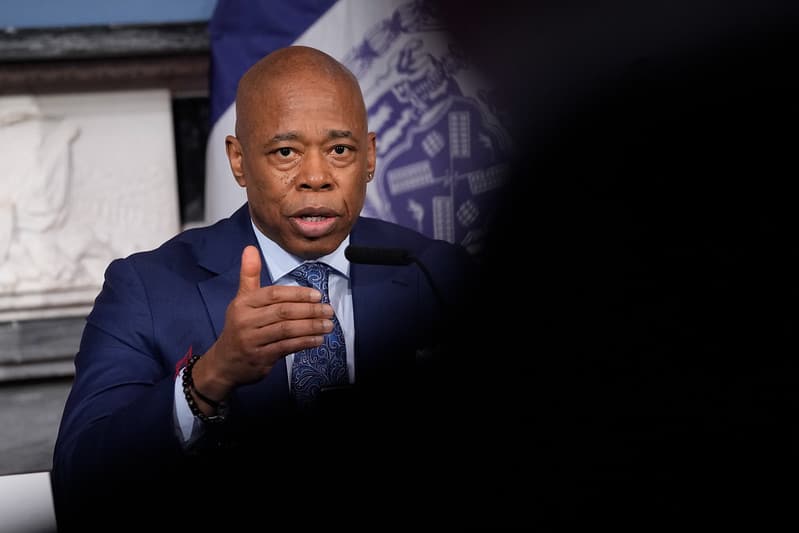Mayor Adams cancels planned April budget cuts – slashing migrant spending instead

Mayor Eric Adams cancelled planned April budget cuts, while moving to reduce migrant spending by another 10%. Wednesday, Feb. 21, 2024.
Michael Appleton/Mayoral Photography Office
Mayor Eric Adams announced Wednesday that he is pulling back on another round of planned across-the-board budget cuts and is instead opting to slash spending on services for newly arrived migrants by another 10%, following an earlier 20% trim in November.
In addition to canceling the belt-tightening measure planned for April, the administration is also easing up on a full hiring freeze that had been in effect since last fall, instead using a 2-for-1 hiring model going forward. Furthermore, it is loosening restrictions on other-than-personnel agency spending.
On top of another trim in migrant spending, City Hall says it was able to avoid the cuts, which were made to close a sizable projected budget gap, due to better than expected tax revenue for last year.
Adams, during a Wednesday interview on ABC7, said if the planned April cuts had gone through, they would have had an acute impact on New Yorkers’ everyday lives.
“You’re not going to see some of those draconian steps that we were going to have to take as it would get in the way of the cleanliness and the safety of our city,” the mayor said. “If we had to do the third round, it would impact garbage pickup, it would impact services to our older adults, it would impact libraries, it would impact a series of services that you would actually see the difference.”
The mayor’s backpedal comes after he made two previous rounds of 5% cuts to nearly every city agency’s budget last month and in November, under his so-called “Program to Eliminate the Gap” (PEG). Included in those initiatives was the 20% reduction in migrant spending.
The cuts were made to close a budget shortfall fueled by the expense of providing for tens of thousands of migrants as well as drying up COVID-19-era federal aid and settling several expensive municipal labor contracts.
Adams, in January, had already begun to reverse course on some of the broad budget reductions he first announced last fall, restoring unpopular trims to the Police, Sanitation and Education Departments. He said those moves were possible because he slashed migrant spending by 20% and the city brought in more revenue than expected from 2023 tax collections.
Those moves also helped the city close the projected $7.1 billion budget deficit that it was staring down in the fall.

During the ABC7 interview, Adams said the city is able to cut migrant spending by no longer treating the influx like an emergency.
“When we inherited this we were in an emergency state, emergency conditions cost more money, we’re now transitioning into a more stabilized state because this is going to be here for a while,” Adams said during the ABC7 interview. “By doing that, we can negotiate contracts, we can look at long-term planning.”
The mayor has faced mounting criticism from the City Council, the body with whom he must negotiate the budget, over his drastic spending reductions and subsequent reversals. Several council members and advocates have charged the mayor “manufactured” a budget crisis to compel the Biden administration to give it more migrant aid.
However, Council Speaker Adrienne Adams and Finance Chair Justin Brannan, in a joint statement, said they were “relieved” that the mayor backed away from the April cuts.
“As the Council’s economists forecasted, New York City’s economy has proven durable and resilient, and blunt cuts that had a disproportionately negative impact on vital programs were never necessary,” they said.
Murad Awawdeh, executive director of the New York Immigration Coalition, was far harsher in his response to the news. He blasted the mayor for announcing cuts and blaming them on the migrant influx only to reverse them months later.
“Mayor Adams is becoming the real life example of the boy who cried wolf,” Awawdeh said, in a statement. “After spending months scapegoating asylum seekers for what the mayor described as a looming fiscal crisis that required deep cuts to the city’s social services — he has had to retract his words and budget cuts twice already. While that’s good news for the city and New Yorkers, in general, this Mayoral Administration fails to take any responsibility for the false narrative it has created about asylum seekers.”
The administration has rebuked those arguments, claiming the city would be in far worse financial shape if it had not enacted the broad cuts, pointing to recent praise of its fiscal management from the independent credit rating agency Moody’s.
The credit rating agency, in a Tuesday report, said the Aa2 bond rating it gave the city “reflects successful implementation of budget measures to help close budget gaps in the current and succeeding fiscal year primarily caused by the migrant crisis.”




